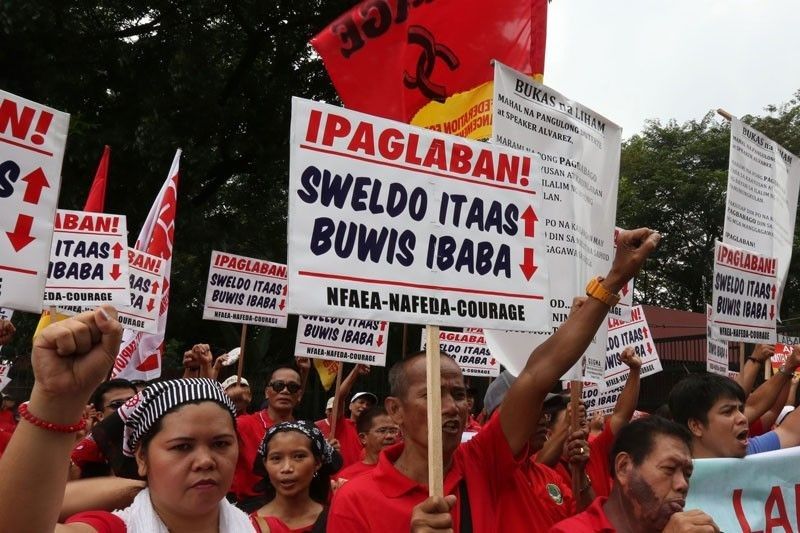Duterte Year 2: TRAIN threatens poor, president's popularity
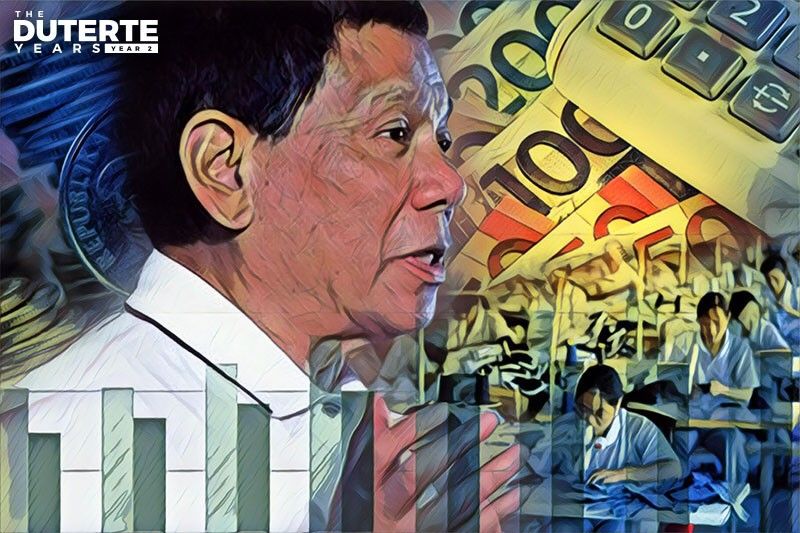
This piece is part of a news analysis series on the second year of the Duterte administration.
MANILA, Philippines — When he assumed the presidency two years ago, Rodrigo Duterte promised to bring inclusive growth and pluck 9 million Filipinos from poverty.
But he has a problem: rising prices in the Philippines—partly stoked by his new tax law—continue to hit his political base, and some say help from the government is likely to be delayed and inadequate.
In May, inflation spiked to a fresh five-year high of 4.6 percent, putting the year-to-date figure to 4.1 percent or above the Bangko Sentral ng Pilipinas’ 2-4 percent target range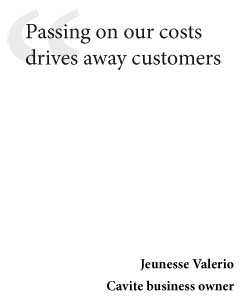 . The BSP has responded by jacking up interest rates for a second consecutive month.
. The BSP has responded by jacking up interest rates for a second consecutive month.
“Some of our customers get surprised whenever we abruptly raise the prices of goods due to higher costs,” said Jeunesse Valerio, 29, who runs a general merchandise business in the province of Cavite in the CALABARZON Region, where inflation accelerated to 4.0 percent in May from 3.9 percent a year ago.
“Passing on our costs drives away our customers,” Valerio added.
People have blamed soaring prices on the Duterte administration’s Tax Reform for Acceleration and Inclusion law, which lowers personal income taxes while raising excise levies on fuel and “sin” products, among others. Supply-side factors like higher global oil prices—worsened by the continuing depreciation of the peso—are also pushing up commodity prices.
Some lawmakers have called for a review of the TRAIN law, and have challenged the tax reform’s constitutionality before the Supreme Court.
TRAIN’s impact
The TRAIN law, like other policies, was crafted based on macroeconomic assumptions by state economists led by Duterte’s economic managers. According to the country’s policymakers, the TRAIN law has one goal: to make the tax system simpler and more fair while shifting the burden off lower-income segments toward the “ultra-rich.”
But based on the Department of Finance’s estimates, which were used in crafting the TRAIN law, poor families will feel the sting of inflation more than the rich will. To note, economic assumptions are not always correct so these are reviewed and revised regularly.
The DOF’s projections also show the richest 10 percent will pay more for higher excise taxes on fuel—which contributes to the price of other goods and services—given their greater oil consumption than the poor.
Inflation ‘spoils’ growth
Data from the Philippine Statistics Authority show consumer spending, which accounts for about seven-tenths of the Philippine economy, grew at a slower pace of 5.6 percent in the first quarter of 2018 from 5.9 percent a year ago.
This was despite the higher take-home pay granted by the personal income tax cuts under the TRAIN law that took effect last January 1, although analysts at ANZ Research had said the easing in consumer spending “is likely temporary with some expenditures front-loaded ahead of the tax reform in early 2018.”
Socioeconomic Planning Secretary Ernesto Pernia said inflation “spoiled” the country’s economic growth in the first three months of the year. The economy grew below the government’s target in the first quarter.
“Higher inflation tends to deter or soften demand for goods that are experiencing price increases,” Pernia said in a press conference last May 10. “We need to really focus on inflation especially because it is the number one concern expressed by Filipinos in surveys.”
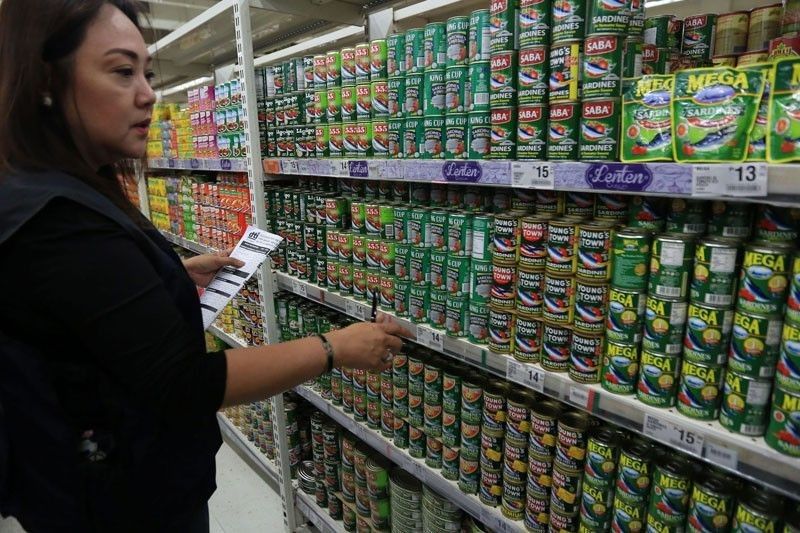
The government will release subsidies of P200 a month to help the poorest Filipinos cope with rising prices. Critics say this is not enough and the release of the aid has been delayed. Edd Gumban, file
Cash transfers and fuel vouchers
TRAIN’s inflationary effects have been hitting the poor. Policymakers saw this coming while the TRAIN act was being crafted, thus the law has earmarked as much as 30 percent of its revenues for “social protection” programs.
These include:
- Unconditional cash transfer amounting to P200 a month for the first year and P300 a month for the second and third year
- Fuel vouchers for PUJs, fare discount for all public utility vehicles, discounted purchase of NFA rice, free skills training under TESDA
- Programs for sugar farmers to increase productivity
The DOF earlier said the TRAIN law will rescue 21 million Filipinos in the long run. It also expects everyone, except the richest, to be better off due to the combined effects of the tax reform and targeted transfers program.
Last February, the DOF said it would start handing out cash support to some 7.4 million households out of 10 million targeted beneficiaries by March. But as inflation heats up, the DOF said the remaining 2.6 million families will have to wait until August.
Problems with logistics have slowed down the distribution of subsidies, casting doubt on whether help will reach all recipients this year. Some lawmakers have already urged the government to bump up the amount of monthly stipend, which is fixed by law regardless of the size of the family.
At a Senate hearing last February, Claire Dennis Mapa—dean of the University of the Philippines School of Statistics—pointed out that the TRAIN law’s safety nets for the poor are not enough to help them weather inflation, adding that the poorest Filipino families spend more on food, especially rice, which was one of the drivers of inflation.
Calls for wage increases
The Makabayan bloc at the House has filed a proposal to raise the national minimum wage to P750. Boy Santos, file
Meanwhile, the central bank has admitted it might miss its target as inflation is projected to average 4.5 percent in 2018, amid risks posed by “second-round” pressures from expected higher minimum wages and public transport fares. But policy makers have vowed to bring inflation back on target next year.
A bloc at the House of Representatives consisting of seven party-list lawmakers has filed a bill to raise the national minimum wage to P750 so workers can cope with rising prices of commodities.
The Trade Union Congress of the Philippines, the country’s largest labor group, is pushing for a P320 across-the-board increase in the daily take-home pay of workers in Metro Manila.
But Trade Secretary Ramon Lopez had warned that a wage increase that is more than necessary is “dangerous” as it could create “strong pressure” on inflation. For its part, the BSP sees a modest P18 to P20 wage hike.
“In case there are additional adjustments in minimum wage, maliit na lang ‘yun (it will be a small amount),” BSP Deputy Governor Diwa Guinigundo said in May.
Duterte’s problem
Aside from revamping the country’s tax system, the TRAIN law also aims to partly fund the Duterte administration’s “Dutertenomics” economic agenda, which is anchored on stronger law enforcement and massive infrastructure spending, as captured by the slogan, “Build, Build, Build.”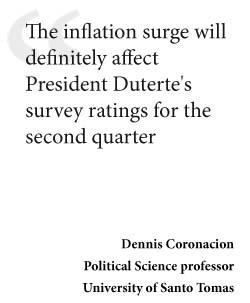
In fact, the Philippines is expected to bag rating upgrades soon due to the implementation of the TRAIN law, which debt watcher S&P dubbed the “cornerstone” of the Philippines’ fiscal strategy.
A higher rating can lower the cost of borrowing in foreign currencies and can increase the country’s ability to attract foreign investment.
But according to a first quarter Social Weather Stations poll released last month, public satisfaction with the Duterte administration’s handling of inflation has seen a sharp 18-point decline to 6 percent.
An April survey by pollster Pulse Asia, meanwhile, showed wages and inflation remain to the top national concerns among Filipinos.
Duterte has acknowledged that the TRAIN act is fanning inflation, adding he is leaving it up to Congress to decide whether to “amend or suspend or modify” the law.
“The inflation surge will definitely affect President Duterte’s survey ratings for the second quarter. I expect to see a drop in his popularity,” University of Santo Tomas Political Science Professor Dennis Coronacion said in an interview.
“Past survey data show that the ratings of a president can drop significantly due to economy difficulties. A fine example is former President Estrada, whose survey ratings began to drop significantly when our country’s economy registered a negative growth in 1998,” Coronacion added. — with Philstar.com intern Ali Ian Marcelino Biong
ALSO READ:
Duterte Year 2: Philippines moves closer to free college tuition for all
Duterte Year 2: 'Without rights, a return to rule by tyrants'
Duterte Year 2: Biggest bust bags a bodegero
- Latest
- Trending






